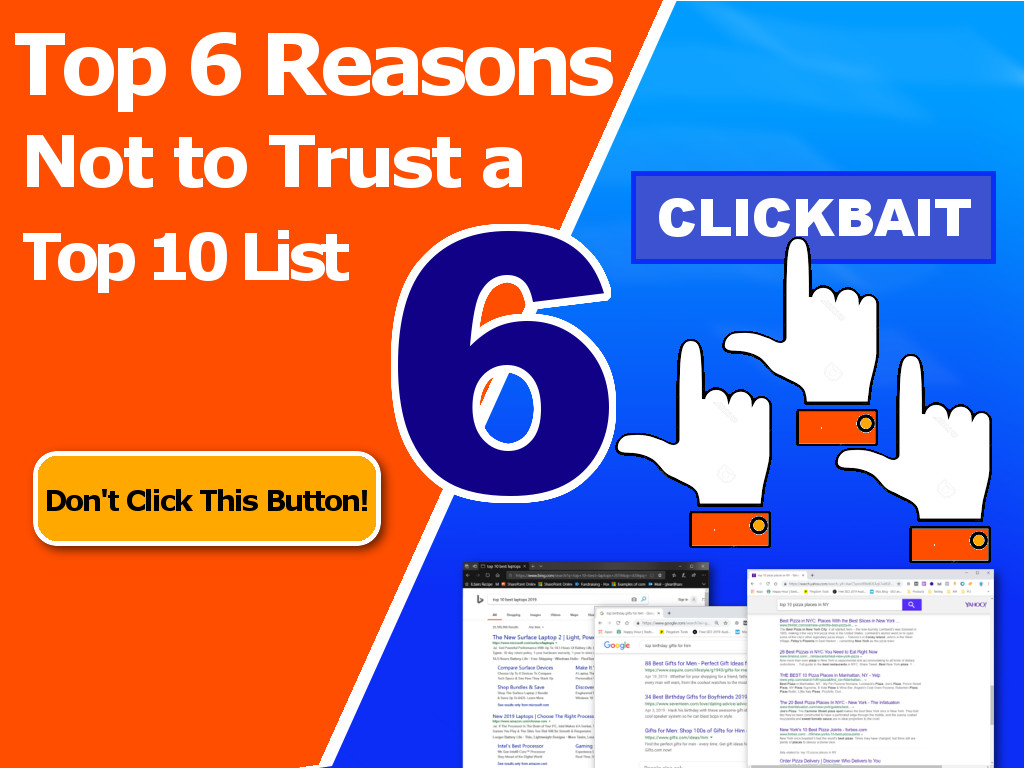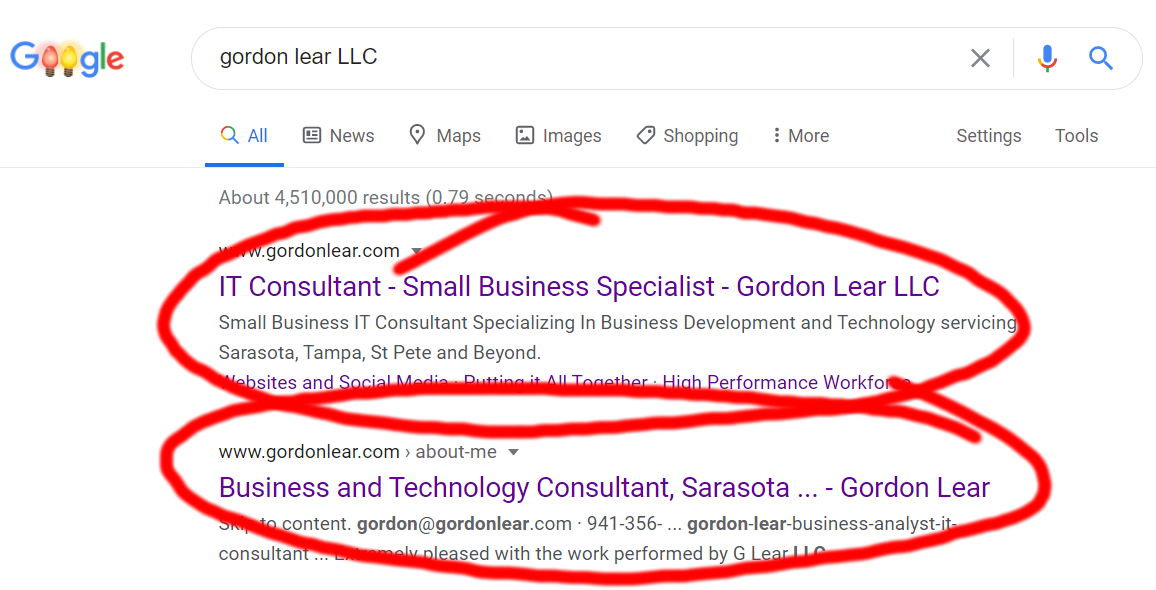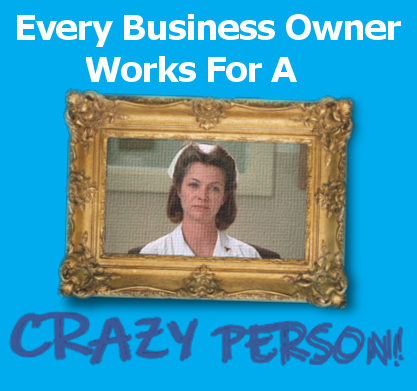So a little background before I tell you why Not to Trust some for the Top 10 Ranking list you will find on the internet.
I have been online longer than Google, Yahoo and Bing. So, to say I have seen it all and then some is accurate. In college I would sit in the lab at a terminal to access my email account using a command line. I used a DOS email client called Pine and search for information on another one called Gopher. At the time, the “internet” was basically for scholars and user friendly wasn’t even part of the dialect. Stuff like page ranking and SEO didn’t even exist.
If you search anything these days the top results will always have some form of Top 10 list. It might be 5 or 15, maybe even say the “Best” or “Greatest” but the idea is always the same.
These ranking pages exploded over the years due to search engines affinity to deem a page useful to the user. When they first started showing up they appeared to be genuine and provided the consumer value. Like anything good on the internet it has become overridden with folks exploiting the system trying to make a buck.
So many Top 10 List pages are Junk
It is sad to say that pretty much any ranking page you find out there these days are junk. These sites have two goals; First, get a high ranking in search engine results on a certain keywords and phrases; Second, get you to visit their page and click a link that will generate revenue.
Informing you about the product or service is nowhere in their agenda. As a matter of fact many of these pages just a copy and paste right from the site they are promoting. There is no commentary or analysis or a breakdown of the good and bad. There is just the basic marketing polish found on the original site.
Here is what to watch out for when looking at ranking si
1.) Affiliate Marketing
So you find a top 10 list that has a clear list of products and services and the top one lists all the great reasons why it is number one. Then right next to it in a big pretty button with “get more info” or “Click for Price” in bold letters.
More often than not it is an Affiliate Marketer (AM). Which is a “professional” marketing someone else’s goods and services for a commission. An AM’s only loyalty is around the commission they get if you click the link they provide and it converts into a sale.
SO what do you think this does to the quality of their ranking list? Well just ask yourself this; If an AM gets $5 per sale for one product and $8 for another which one do you think they will rank higher?
The catch with these commissions is the sale doesn’t have to be that day and many times it doesn’t even have to be that product. As an example, you click an Amazon.com affiliate link and then leave that page only to find yourself on Amazon the next day to by something completely unrelated the AM gets a commission on that sale.
The motivation is monetary
So all the motivation behind their rankings is most likely monetary and you can forget about finding rich thoughtful feedback or some deep product research that requires hard work and insight.
So, you basically find a horrible site that provides you no value. It persuades you to leave their site through an affiliate link rewarded them with a kickback or commission. No wonder AM is a billion-dollar industry and more importantly why the internet is flooded with these Top [put your number here] pages.
The good news here is reputable companies require affiliates to identify themselves as such. So check out the page, most likely on the very bottom in small font you will find a disclaimer. If you do understand you are not reading unbiased content and be cautious its only purpose is to persuade you into clicking an AM link.
2.) Top 10 Lists as Clickbait
Sites make money by displaying advertising on their sites. These top 10 lists can be AM links or just straight up Click Ads.
Looking at a page full of Ads it is hard not to argue the author’s only motivation is all around the revenue. They get paid per click or what is called PPC. The pages maximize the ad space, the click thru’s, and value to their bank account.
The classic overdone PPC sites are those that are almost impossible to read because so much stuff is loading and everything on the page keeps moving and stuff flies at you from all directions. This of course is by design, they want you to accidently click an Ad as you navigate the page. This tricks the user and also screwing over the advertiser because they are paying for bad clicks and traffic from users that never wanted to be there.
These sites are nothing less than annoying. You can’t trust anything they write seeing half the time they are trying to bore you to death so you leave their page through one of their ads. The entire page is one piece of click bait and should not be encouraged. So unless you stop clicking they are not going away anytime soon.
3.) Top 10 Slide Shows and Galleries
This is arguably the most arduous top 10 list page of the web. Its right there with Fake News so it is not uncommon to see both together. These sites are the worst of the worst and often take the Top [your number here] list to the extreme.
The top 50 places to [whatever] will be no less than 50 pages loaded full of advertising to get through. They will even have “Next” buttons as Affiliate or Click-Throughs. Which drive me nuts. You think you are going to the next slide but then you find yourself in the middle of pop-up-palooza! They will throw flyout ads at you, imbed ads in between slides and the info on what that slide is even on the list is non-existent. They are nothing but a time-thief and provide little to no value for the reader.
If you find yourself on one of these sites and you don’t know the source just leave because all you are doing is setting a cookie that tells advertisers you’re a sucker for click bait. Just stay away from slideshows.
4.) Pseudo Sites with Top 10 Lists
Many times top 10 list ranking sites are written by the company selling one of the items on the list. But they do it on a site that appears to be someone other than themselves. It is common practice for a product manager to deploy many sites with content about their product and work like hell to get them all ranked high and basically push the competition to the second page of search results.
As the reader you you have found a bunch of different sources. After reading them you are impressed with the overall consensus across all these sites. You now feel well informed to make a buying decision. However, you have been duped! The product assessments on these pages are aligned because they are all created by the same marketing department!
Its sad, you think you are reading separate perspectives from unconnected sources however you just spent the majority of your morning in one big sales funnel. If you don’t know who owns the site you really should question the validity of the information they present. Always always know you source.
5.) Lead Generation Sites
Looking online for car insurance and you find a “Top 10 List”? Reading the rankings are impressive about the offer promising to save you money and then you to decide click one?
If you read the fine print you could see there is a good chance your information was sent to EVERYONE on the list. Now you have days dealing with in robo calls and junk mail and you are now defined as someone “interested in car insurance” and your Top 10 List information is sold over and over. This will result in more calls and spam. A site that seemed useful has now made the sound of your phone cringe-worthy and your inbox full of distractions and refuse.
6.) Fake Buying Guides
These are just another form of “Top 10” sites that are just as bad for all the same reasons. They just use another important part of the search engines weighting calculation… Age. By putting the Year in the title it tells Google, Yahoo and Bing this list is relevant to NOW (or last year) so you should show it first. Sites use this to exploit the system and give their pages an instant boost. Most of the time these pages are recycled from the previous year. I strongly suggest you stick to buying guides by reputable places like Consumer Reports and ConsumerSearch.com
To sum things up, affiliate marketing and other types of passive income pages are all the rage and you need to know the internet is saturated with these pages. I get those that want to create an online stream of cash with the flexibility to work from anywhere whenever they want. Unfortunately, there are many just looking for a quick buck and will stop at nothing to keep the clicks coming.
So be an informed surfer. Understand the motivation behind the info you are reading and be skeptical of all those pretty buttons and links that trigger that impulse to click. Only user behavior will change how these sites go about things. So if you’re sick of seeing these pages littering the front pages of your search pages don’t feed the frenzy by rewarding them with a visit.












